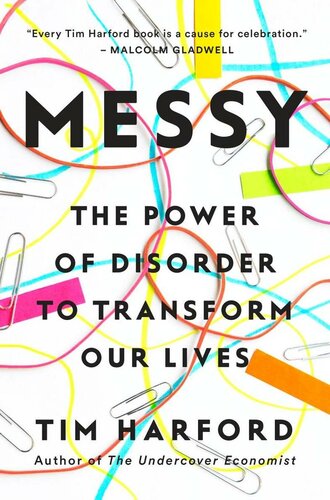
Messy
The Power of Disorder to Transform Our Lives
کتاب های مرتبط
- اطلاعات
- نقد و بررسی
- دیدگاه کاربران
نقد و بررسی

July 18, 2016
Journalist Harford (The Undercover Economist) explores the counterintuitive theory that disorder is at the heart of innovation. His evidence includes the creative genius inspired by the randomness of record producer Brian Eno’s Oblique Strategies and the rich history of MIT’s hastily assembled Building 20. In the business world, Amazon’s Jeff Bezos is extolled for the risk taking that carried the company through the dot-com bust. The book also examines what goes wrong in a system that is too organized. Examples include time-wasting email folders, misconceived methods for evaluating physicians’ competence, and the horrifying results of “the paradox of automation” when a pilot can’t remember how to respond in an emergency due to overreliance on automated operating systems. The book takes readers to some unexpected and entertaining places, including sarcastic corporate social-media accounts, chess strategy, and online-dating algorithms. Harford provides useful and specific instructions on putting his thesis to work, with tips on organizing projects, building an effective team, and honing improvisational skills. Weaving together lessons from history, art, technology, and social and scientific research, Harford’s theories have many potential benefits for individuals and businesses seeking to remain on the creative cutting edge, as well as profound implications for society. Agent: Zoë Pagnamenta, Zoë Pagnamenta Agency.

An award-winning economist celebrates the myriad advantages of clutter and disarray.Economist and journalist Harford (The Undercover Economist Strikes Back, 2014, etc.) is an unabashed supporter of messiness, and his book, a cleareyed defense, explains and supports the many situations in which surrounding oneself with clutter and chaos can actually boost creativity, production, innovation, and even quality of life. It's a tough sell--messiness has an inherent negative connotation attached to it, along with the stigma of laziness--but the author gets to work quickly, citing the careers of music icons David Bowie, Iggy Pop, and Brian Eno, who all benefited from their "strange chaotic working process" (which involved drawing random, gnomic instructional cards) to produce several critically acclaimed studio albums in the late 1970s. Commercially successful novelist Michael Crichton has also been well-served by "project-juggling behavior," as have certain workplace departmental team collaborations which, Harford writes, have found success with a "willingness to allow a degree of messiness into a tidy team." This is especially evident in MIT's hurriedly, haphazardly designed Building 20 and Steve Jobs' serendipity-inspired office layouts at Pixar Studios. The whirling dervish of spontaneity also historically benefited Martin Luther King Jr.'s infamous, extemporaneous 1963 speech. Harford also examines Jeff Bezos' slyly effective scramble to prevent Amazon from buckling beneath the dot-com bust and Donald Trump's slapdash presidential bid. The author believes that there are dangers in rigidly overorganized, structured systems, as in the example of an out-of-practice airplane pilot whose overreliance on autopilot navigation proved disastrous. From diversified neighborhood communities and school playgrounds to messy desks and algorithmic dating websites, Harford presents the strategies of disorganization as unique and enlightening and convincingly offers reinforced encouragement to those who may find themselves "tempted by tidiness" to instead "embrace some mess instead." Though not all readers will find this unconventional perspective on disorder particularly sage, Harford's exploration is entertaining and, despite the topic, well-constructed. COPYRIGHT(1) Kirkus Reviews, ALL RIGHTS RESERVED.

August 1, 2016
Is a tidy and sterile environment truly ideal? Journalist and economist Harford (The Undercover Economist) explores the concept of messiness, referring to more than physical disarray. Using real-life examples from businesses such as Google and famous figures such as Martin Luther King Jr., as well as citing scientific studies, Harford suggests that messiness has its own value. Organization doesn't necessarily increase production; disruption can inspire creativity. Diversity is strength, as seen in thriving ecosystems and cities. In short, life is messy. In a chapter about winning, Harford describes how Amazon's hasty and experimental workings helped make it the company it is today. When discussing automation, he details how a plane crashed because people passively trust automatic systems that attempt to be orderly in a chaotic world. Regarding incentives, Harford exemplifies how quantifiable targets can negatively impact what they intend to improve. Other topics include collaboration, workplaces, improvisation, and resilience. VERDICT For general readers of popular psychology, sociology, or business, this absorbing book offers a different approach from instructional decluttering manuals by celebrating the successes derived from the unplanned, unscripted, and unknown. [See Prepub Alert, 4/25/16.]--Janet Clapp, N. Clarendon, VT
Copyright 2016 Library Journal, LLC Used with permission.

























دیدگاه کاربران